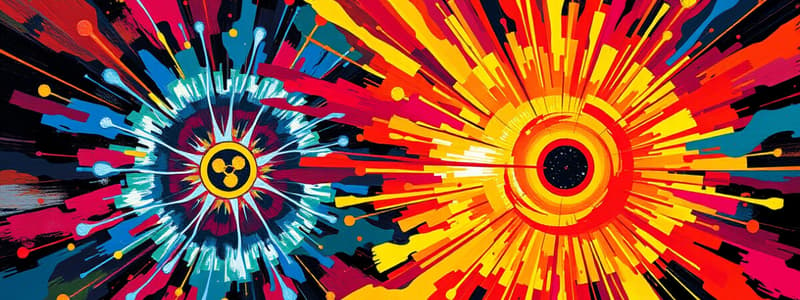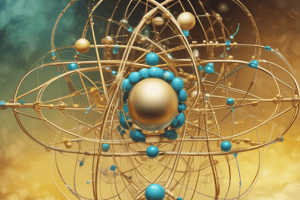Podcast
Questions and Answers
What is the difference between nuclear fission and nuclear fusion?
What is the difference between nuclear fission and nuclear fusion?
Nuclear fusion is the process where 2 or more atoms collide at high speeds to form a new type of atomic nucleus, while nuclear fission is the process of an atom splitting into 2 atoms.
What are ways to remember the two?
What are ways to remember the two?
You can spell sun with fusion and when you pour soda onto ice, it fizzes like fission.
What is nuclear fusion and nuclear fission?
What is nuclear fusion and nuclear fission?
Nuclear fusion is the energy process in the sun, while nuclear fission is the energy process in a uranium plant.
Are both nuclear fusion and fission considered reactions?
Are both nuclear fusion and fission considered reactions?
What are examples of fusion?
What are examples of fusion?
What are examples of fission?
What are examples of fission?
Flashcards are hidden until you start studying
Study Notes
Nuclear Fusion vs. Nuclear Fission
- Nuclear fusion involves combining two or more atomic nuclei to create a heavier nucleus, releasing energy in the process.
- Nuclear fission involves the splitting of a heavy atomic nucleus into two lighter nuclei, also releasing energy.
Memory Aids
- "Fusion" can be remembered with the word "sun" since nuclear fusion powers the sun.
- "Fission" can be associated with "fizz," mimicking the sound of soda fizzling when poured onto ice, reflecting the splitting nature of the process.
Applications and Processes
- Nuclear fusion is the source of energy for stars, including the sun, where immense heat and pressure stimulate the fusion of hydrogen atoms into helium.
- Nuclear fission is prevalent in nuclear power plants, particularly those that use uranium as fuel for generating electricity.
Nature of Reactions
- Both processes are classified as nuclear reactions, involving changes in the nucleus of atoms.
Examples of Fusion
- Fusion results in the formation of heavier elements from lighter ones, such as hydrogen fusing to form helium.
Examples of Fission
- Fission can be visualized as a "fizzing" effect where a heavy nucleus breaks down, which is utilized in nuclear bombs and as a power source for military vessels like submarines and aircraft carriers.
Studying That Suits You
Use AI to generate personalized quizzes and flashcards to suit your learning preferences.




